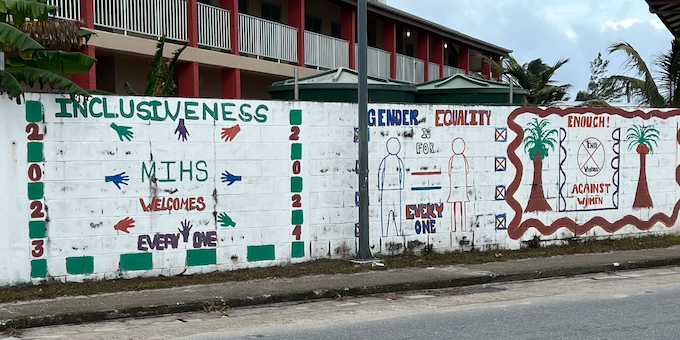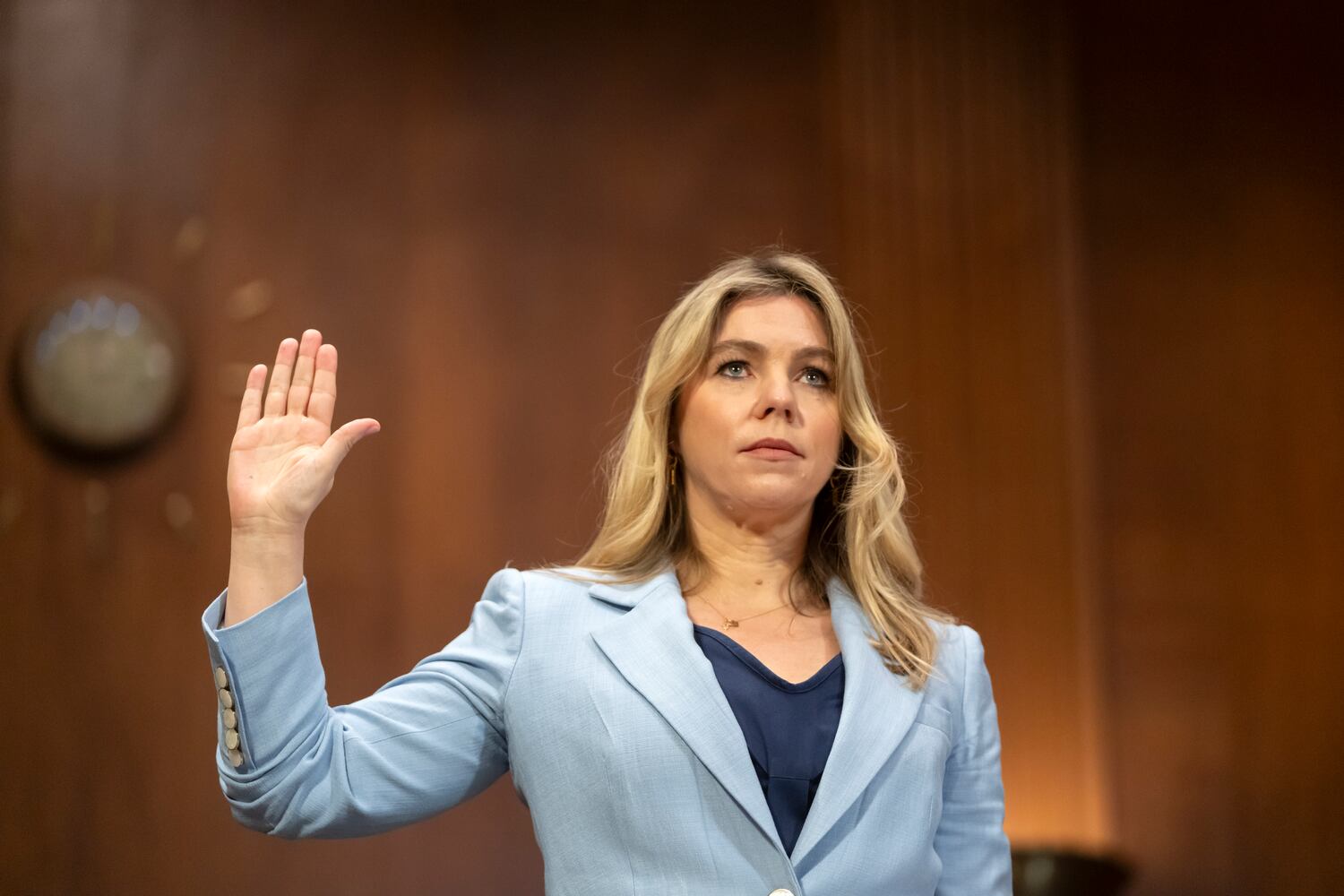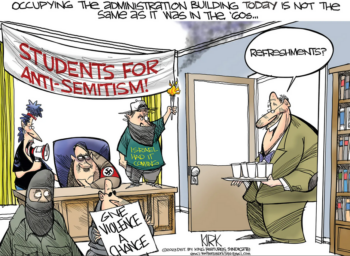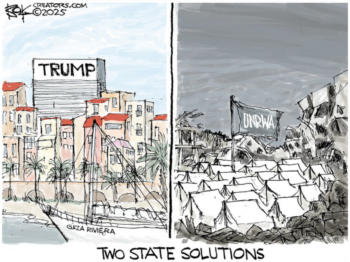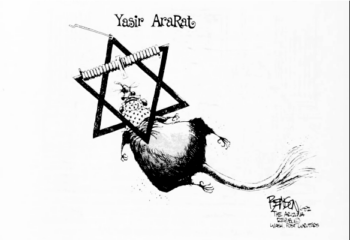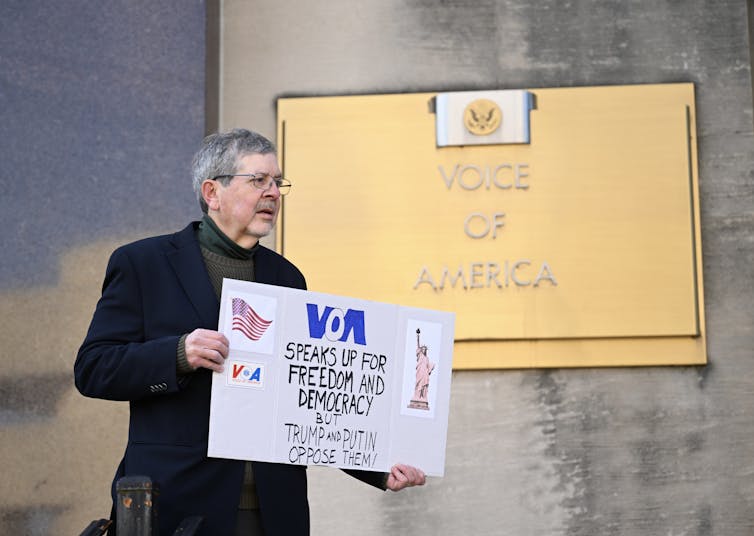Universities in the United States are facing one of the most serious attempts to impose political control on higher education since the anticommunist loyalty tests of the 1950s. Whatever one thinks of the issues being debated today, such as the Israel/Palestine conflict, playing politics with federal funding is a threat to open inquiry. Administrators and faculty are scrambling to respond and resistance is strengthening, although Columbia University’s capitulation to the Trump administration isn’t heartening.
It’s too early to write an obituary for academic freedom, but whatever the outcome of these battles, universities in the United States have lost prestige that won’t be regained quickly. Though it’s difficult to critically self-reflect when under attack, I think we academics should consider our mistakes when trying to understand public opinion and political realities.
I retired from the University of Texas at Austin in 2018 and now live in a rural area, and so I’m far from the front lines. I empathize with former colleagues, but I can’t help but reflect on those colleagues’ failures in the past to offer a robust defense of academic freedom in cases in which I was in the crosshairs. So, while at the same time that we organize to defend higher education, I want to highlight two episodes from my career that raise an important question: Where do threats to academic freedom come from? Not always from government officials.
To be clear: I never faced the kind of threats that some professors and institutions do today, such as deportations and terminating entire academic programs. But I have seen how social penalties can be effective in silencing people, as illustrated by the censure from my bosses because of writing I did after the terrorist attacks of September 11, 2001, and the shunning that came after my critique of the ideology of transgenderism. In both cases, censure and shunning didn’t change my behavior but did have an effect on choices that others made.
9/11 and the failure of a university
One of the most important decisions a country can make is the choice to go to war. In a healthy democratic culture, that decision should be thoroughly debated before political leaders deploy troops in battle. But within hours after the 9/11 attacks, politicians of both parties were climbing over each other to get to microphones to call for a military response.
I spent most of that day in my office watching the news coverage while trying to reach friends in New York to make sure they were safe. My memory of the day is blurry, but I remember clearly that by mid-afternoon—before anyone even had a clear understanding of the details of the events—it seemed inevitable that the United States would bomb someone, somewhere in retaliation. Whether it would be legal or sensible was irrelevant—politicians were preparing to use the terrorist attacks to justify war. By the end of that day, I had written the first of many articles sharply criticizing US foreign policy and arguing strongly against going to war.
Not everyone agreed with me. For weeks, my voicemail and inbox were filled with critics who described me as a coward, a traitor, unpatriotic, and/or unmanly. (The most revealing, in a psychological sense, were the messages from men who imagined the sexual punishment I deserved, including being raped by Osama bin Laden.) After that article ran in the state’s largest newspaper and became a topic on conservative talk radio, people began calling for the university to fire me. Within two weeks, the president of the University of Texas at Austin responded publicly, calling me “misguided” and describing me as “an undiluted fountain of foolishness.” (He was a chemist, not a poet.) Other university officials added their own denunciations, some of which were forwarded to me, but none of my bosses confronted me directly. Because I was a tenured professor with considerable job protection, none of them moved to fire me.
The criticism continued for a few months, but I continued to write and speak out. At the time, I was already a part of a small national network opposing US militarism, and the support of people in that movement sustained me. Locally, we formed the group Austin Against War to organize protests and do political outreach. Around the country and throughout the world, many people defied the jingoist rhetoric and challenged that militarism.
The university president’s statement had no effect on my activity, but it was effective in a larger sense. Many UT faculty members shared my views, yet only a handful joined the initial organizing efforts, I assume at least in part because of fear of being targeted as I had been. One untenured professor I knew stopped speaking out against militarism after his dean told him that continuing to circulate critical writing would almost certainly cost him his job, and I assume others made similar choices. Several graduate students from other countries told me they wanted to get involved in antiwar organizing but were afraid it could lead to the US government revoking their visas. Faculty colleagues with lawful permanent resident status who were from Muslim-majority countries on a special-registration list created the following year (the National Security Entry-Exit Registration System) told me they feared that the government would revoke their green cards even for trivial errors in record-keeping. The threat of legal action, fears about losing jobs, and peer pressure were enough to undermine a robust debate on my campus, though student activists created as much space as they could. But the university administration was either hostile or mute.
The United States invaded Afghanistan with little domestic or international opposition beyond the small antiwar groups and pacifists. The Bush administration’s weak case for invading Iraq sparked more domestic and international opposition, leading to the world’s largest coordinated day of political protest on February 15, 2003, when millions of people unsuccessfully sought to stop the pending invasion. Soon it was clear that the antiwar movement’s analysis had been sound, as the disastrous consequences of those ill-advised invasions began to be measured in hundreds of thousands of deaths, trillions of dollars, and destabilized societies in the Middle East and Central Asia.
Protected by tenure, I continued teaching at UT until retirement. That was positive for me, but it does not change the fact that my university failed in its obligation to foster the conversation that citizens in a democratic society needed at a crucial moment in history. Throughout that period, I argued not only that I had a right to speak out but that the university had a duty to provide a forum to make use of the expertise of the faculty and engage the community. In debates over going to war, which understandably generate strong emotions, evidence and logic are crucial, and universities have valuable resources to offer. The dominant culture needed, and still needs, to engage the evidence and logic presented by critics of US imperial foreign policy and militarism.
Transgenderism and the failure of the left
For more than a decade, I have offered a critique of the ideology of the transgender movement and what I believe is the failure of liberal/progressive/left people and organizations to engage with radical feminist critiques of patriarchy. I knew the potential consequences when in 2014 I wrote my first article outlining an analysis rooted in the radical feminist perspective on transgenderism, but feminist colleagues had challenged me to get off the sidelines in the debate, and I knew they were right.
Later that year, a local left/anarchist bookstore that I had long supported sent an email blast (without speaking to me first) announcing that it was severing all ties with me. Trans activists came to some of my public lectures on feminist topics to protest or try to shout me down, even though the talks weren’t about transgenderism. Several groups that had invited me to speak about such topics as the ecological crisis withdrew invitations after receiving complaints. And, of course, I can’t know how many people who might have wanted to include me in an activity declined to invite me just to avoid hassles.
No person or organization has an obligation to associate with me, of course. The unfortunate aspect of all this was that none of the organizations or people who shunned or de-platformed me ever explained why my writing was unacceptable, beyond repeating accusations of transphobia. I was denounced for holding views that were asserted to be unacceptable, though no coherent argument to support that denunciation was ever presented to me.
This pattern continued for the remainder of my time at the University of Texas and in Austin, as many friends and faculty colleagues with whom I had worked on a variety of education and organizing projects avoided me. After the 2016 presidential election, I was part of a group that organized a teach-in on the political consequences of Donald Trump’s presidency. By that time, I knew my role should be behind the scenes, to avoid everyone’s work being derailed by an objection to my involvement. I had already received enough criticism to know that if I were one of the speakers, trans activists might protest. So, I handled catering and publicity, out of public view, except that the publicity material included my name and email address. That was enough to generate at least one complaint to the university, from someone who said he wouldn’t feel safe attending, knowing that I was involved in any way.
It turned out that was the last collective education project I was part of, either at UT or with liberal/progressive/left organizations in Austin. When I talked with people about collaborating on education events that in previous years they would have wanted to be involved in, they told me my trans writing made it impossible. More common was silence; faculty colleagues I had worked with in the past simply stopped returning emails or phone messages. I continued to work on projects, either alone or with one trusted friend who shared my analysis, but I was no longer welcome in most left circles.
I also had a number of friends and university colleagues who agreed with my critique, but would acknowledge that position only when speaking privately. These were not shy people who were afraid of public conversation about contentious issues in general. But they had observed the backlash to any challenge to the liberal/progressive/left orthodoxy on transgenderism and wanted to avoid being attacked. I never held that against anyone; we all make strategic decisions about what political battles we want to fight.
The strangest experiences came with a few friends who seemed afraid to talk even privately, always steering conversations away from the subject. In two cases, I never really understood what my friends thought about the issue. Why the hesitancy to discuss something that was so much a part of the public debate about sex/gender justice, which they both cared about deeply, even when talking in private? I can think of two reasons. They may not have trusted me to keep their remarks confidential, but in both cases I had kept confidences before and they had no reason to doubt me. The more plausible explanation is that they didn’t want to consider reasons to challenge the liberal position that was dogma in their institutions. One of them read my 2017 book, The End of Patriarchy, and wrote me to say he thought that the chapter on transgenderism was “a great expansion of your original argument. I just don’t like it, even though it appears to be perfectly logical.” He later told me that he found conversation about the subject “unsettling,” and I honored his request that we not discuss it further.
While these experiences were at times stressful and generally unpleasant, women who have challenged the transgender-industrial complex tend to fare much worse. I never lost a job and have never been physically attacked. I lost some friends and missed out on organizing efforts to which I think I could have contributed, but I had other friends to rely on and always found a way to continue doing educational programs on campus.
Just as in the 9/11 example, my experience isn’t a story of how my freedom of expression was constrained. No governmental agency shut me down, and the rejection didn’t stop me from writing or speaking out. Many other radical feminists continue to write and speak, as well. But many more people have either muted themselves or been driven out of organizations. It’s hard to imagine how we will deepen our understanding of a subject as complex as transgenderism if people making reasonable arguments that challenge the current liberal dogma are constantly attacked.
One last personal reflection. My biggest frustration is when trans activists tell me that my work is evidence of transphobia. Stonewall, a prominent UK LGBTQ+ organization, defines transphobia as the “fear or dislike of someone based on the fact they are trans, including denying their gender identity or refusing to accept it.” I do not fear or dislike people who identify as transgender, and I don’t deny their own sense of their identity. Offering an alternative explanation of an experience is not refusing to accept the experience.
This is not merely an academic question for me. As a child, I was short, skinny, effeminate, and late to hit puberty—I was the smallest boy in my class and lived with a constant fear of being targeted by other boys. I also grew up in an abusive household that made impossible any semblance of “normal” development. Until the age of thirty, I had no way to make sense of that experience and assumed I was just an oddball. When I began reading feminism, especially the radical feminist writers whom I found most compelling, I realized that parts of my experience were common in patriarchy. I had suffered in the way many boys in a patriarchal society suffer, and as a man I had sought to escape that suffering by conforming to patriarchal norms of masculinity. Feminism offered a way out of that trap.
I have empathy for people who don’t fit conventional categories and face ridicule or violence for being different, in part because I have experienced those struggles and threats. I have tried to present arguments based on credible evidence and sound logic, but underneath those intellectual positions is my own struggle, pain, and grief, which I think has sensitized me to the struggle, pain, and grief of others. But emotions are by themselves not an argument. Evidence and logic matter. The transgender movement needs to engage the evidence and logic presented by radical feminism.
Lessons learned?
I’m not bitter about these incidents during my teaching career. I will always be grateful that I had a chance to earn a PhD and make a living teaching. The vast majority of my experiences at the University of Texas were not only positive but joyful.
In the classroom, I prided myself on considering all relevant points of view. When lecturing to large classes, I would often make a point on one end of the stage, then walk deliberately to the other side and say, “On the other hand …” I didn’t pretend to be neutral—I had a point of view about which analyses were most compelling—but I worked hard to be fair in the presentation of conflicting views.
I enjoyed engaging with colleagues and students who disagreed and encouraged them to challenge me. As I said often, “Reasonable people can disagree.” I apparently said that so often that at the end of one a semester a student gave me a coffee mug with those words printed on it. I occasionally heard from, or about, a conservative student who disliked my class on political grounds, but that was rare, though of course I can’t know how many students felt that way but never spoke to me about it.
But outside the classroom, I made a conscious choice to advocate for political positions that I knew would be controversial. I never shied away from defending my views, and I had hoped that colleagues would do the same. I made it clear in public that I was speaking as a citizen, not a representative of the university. But I also argued that when I thought I had knowledge acquired as a professor that contributed to public discourse I should share it, precisely because I was an employee of the state of Texas. That strengthens democracy.
I wish that university administrators had made that case to the public after 9/11, instead of pursuing the duck-and-cover strategy they chose. I wish my faculty colleagues would engage challenges to left/liberal dogma, such as in the transgender debate.
As academics today struggle with a hostile culture, it’s important to fight back, to defend the value of higher education. But it’s also wise to reflect on our missteps.
Where do threats to academic freedom come from? Political partisans, of course. But sometimes from the folks running universities and sometimes from faculty colleagues.
The post
Academic Freedom under Attack first appeared on
Dissident Voice.
This post was originally published on Dissident Voice.
